Part one of this review is here.

Martha marries Kit, a gay British diplomat serving in Moscow in 1973. This platonic marriage suits them both — Kit feeling the need to disguise his sexuality; Martha finding a route out of the conventional home-bound English middle-class future her parents see for her.
Sarah Armstrong’s The Wolves of Leninsky Prospekt plays off the temporal and physical settings of Moscow and 1973 against one another.
Martha embraces life in Soviet Moscow, with all its faults and fears. For Kit, working in the British Embassy, the reality of Cold War tensions are ever present.
Their hard-hitting impact on families, and particularly wives, in the Embassy community is vividly drawn. The urbane but constrained world of the British Foreign Office and the wider diplomatic community is essentially pre-feminist in the early 1970s. It is a world where diplomats are male, and the role of ‘the wife’ is unpaid but fenced around by expectation.
At the Embassy picnic, the women sit together watching the children whilst the men talk business. As Martha observes
The men were all steering the women to ignorance. Some of it might be necessary, I supposed, but they didn’t have to enjoy it so much.
Out for a meal in the apartment of another diplomatic couple, the husband thinks nothing of saying to Kit
‘Shall we go out on the balcony for a cigar? The ladies can tidy up’.
the wolves of leninsky prospekt
And beyond the unthinking sexism, sexual harassment, if not the norm, occurs with impunity.
Without too deliberately subversive intent, Martha finds that she is trangressing unwritten rules; symbolised by her failure to join the Embassy choir, organised by the wife of Sir Alec Highfield, the British Ambassador to the Soviet Union.
Martha moans to Kit
‘I don’t really want to be an embassy wife. I don’t have to, surely?’
‘It makes this run more smoothly if you let Emily Highfield take charge, I know that’.
the wolves of leninsky prospekt
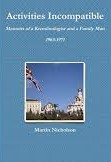
All of these mores of diplomatic life in the early 1970s are so convincingly drawn that I wondered about their source, and was intrigued to see the acknowledgements reference the third volume of Martin Nicholson’s self-published memoirs, Activities Incompatible.
Martin Nicholson (of whom I was briefly a colleague) served in the British Embassy in Moscow from the mid-1960s until 1971. [a good obituary of Martin Nicholson, 1937-2025, was published in The Times on 23 April 2025].
Nicholson’s memoirs of these years mention many figures still on the Russia scene in the UK when I began my career in the early 1990s. (They also note the fiction of Anne Telscombe, who lived in Moscow during that period and whose work will feature somewhere along the way as russiainfiction.com reviews its first 100 books). Sarah Armstrong credits too the excellent memoirs of historian Sheila Fitzpatrick, A Spy in the Archives.
[Update: Russia in Fiction has now reviewed Anne Telscombe’s novel The Listener]
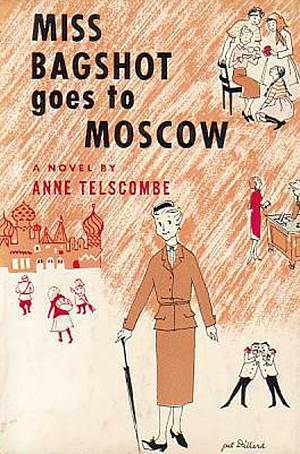
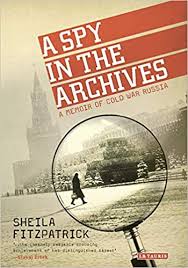
Martha’s arrival in Moscow is preceded by her coming across a booklet of short stories set in Russia and written by ‘E.V. Mann’. Though this is no library book, she finds it unaccountably placed with her other pre-Moscow reading as she leaves the village library one afternoon in the weeks before flying to Russia.
Once in Moscow, Martha is befriended by their author, an elderly Englishwoman, Eva Mann, known and distrusted by the British Embassy for having emigrated to the USSR and being a loyal supporter of the Soviet regime. Throughout The Wolves of Leninsky Prospekt, short stories from the E.V. Mann booklet —dreamlike allegorical episodes, wolves and snow and being watched and running— interrupt the central narrative.
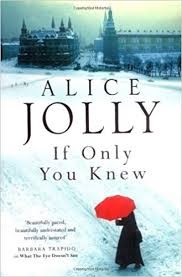
The characters in The Wolves of Leninsky Prospekt bring to mind those in Alice Jolly’s moving novel If Only You Knew (2006).
Each of these novels features a young woman living in Moscow only because her male partner has a job there; and in both narratives, the male partner in question is a friend since childhood. In each of these novels too, the young heroine’s story is shaped both by the largely off-stage figure of her father, and by meeting on arrival in Moscow a slightly mysterious older woman who is a British émigrée residing in Russia.
Even the characters’ names carry echoes of the respective novels. In If Only You Knew the main character is called Eva and the enigmatic older woman Maya; in The Wolves of Leninsky Prospekt the main character is called Martha and the enigmatic older woman Eva.
Beyond such similarities though, these stories strike out in different directions. Their tone and motifs and —of course— plots differ. Their decades-apart temporal settings are prominent and distinctive, with Jolly’s novel being set in the year that the Soviet Union collapsed, and Armstrong’s during the high Sovietism of the middle Brezhnev years.
It is always fascinating to read about those Brezhnev years in the knowledge of a fact that would have seemed extraordinary to most Soviet citizens and observers back then; namely, that the regime’s remaining years were numbered in short order.
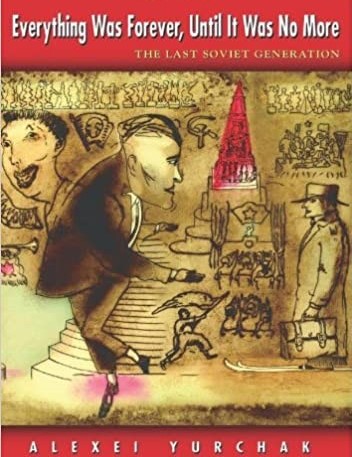
Thinking along those lines always puts me in mind of the brilliant title of Alexei Yurchak’s academic volume Everything Was Forever, Until It Was No More (2005).
For all that life in the Soviet capital charms and captivates Martha, one of the strengths of The Wolves of Leninsky Prospekt is that it is no nostalgia-tinged account of life under ‘developed socialism’. The potential for brutality in those days, and under that system, remains present throughout, with the titular wolves representing its agents.
By no means the fiercest example of this side of life in Soviet Moscow being when Martha returns home one day to find that all of her clothes have been taken out of the wardrobe and put on her bed.
Kit had warned me that this could happen. People came into your home or hotel room and made it obvious that they had been there.
I wasn’t prepared for how sick it made me feel … They clearly had a key.
the wolves of leninsky prospekt
I had no trouble with this in terms of realism. A British friend of mine who lived in Moscow for several years in the first decade of this century tells of coming home after work, unlocking his apartment door, and going into the kitchen to find the kettle coming to the boil.
At novel’s end —and for those who, unlike me, get fussed about spoilers, this does not give much away plot-wise— Martha is back in England, and back at university. Only this time she is not in Cambridge, but in Colchester, at the University of Essex. She is now more at home in a new university like Essex than in ancient Cambridge’s cloistered halls. Essex, with its 1970s reputation for political radicalism and it brutalist square concrete architecture, suits Martha; but, appropriately for this delicately nuanced novel, only up to a point.
It felt like home. I imagined having a room in one of the tower blocks, almost as high as my home in Moscow … there seemed to be many similarities with Moscow at the university when I arrived earlier, but gradually the differences reminded me that I was not there. The block of buildings didn’t have guards or a dezhurnaya on every door, watching and noting who came in and out. There was laughing and kissing in public. When I ordered food, they had it.
the wolves of leninsky prospekt
Part one of this review is here.